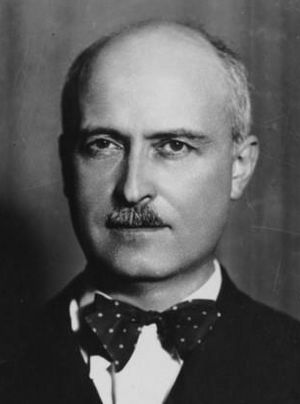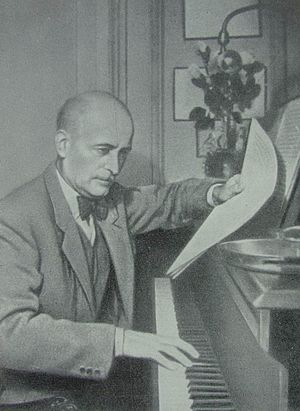Jacques Ibert facts for kids
Jacques Ibert (born August 15, 1890 – died February 5, 1962) was a famous French composer. He started learning music when he was very young. He went to the Paris Conservatoire, which is a top music school. He even won their highest award, the Prix de Rome, on his first try! This was amazing, especially since his studies were paused because of World War I.
Ibert had a very successful career writing music. He created seven operas, five ballets, and music for plays and movies. He also wrote pieces for piano, choirs, and small groups of instruments. People often remember him for his orchestral works like Divertissement (1930) and Escales (1922).
Ibert didn't stick to just one style of music. He liked to try different things, which is why he's called an "eclectic" composer. You can see this in his most famous pieces: Divertissement is a fun, lighthearted piece for a small orchestra, while Escales is a big, romantic piece for a large orchestra.
Besides composing, Ibert also directed the Académie de France at the Villa Medici in Rome. During World War II, his music was banned by the government in Paris, and he had to live in Switzerland for a while. After the war, he returned to his important role in French music. His last big job was in charge of the Paris Opera and the Opéra-Comique.
Contents
Biography
Early Life and Studies
Jacques Ibert was born in Paris, France. His dad was a successful businessman, but his mom was a talented piano player. She had studied with a famous teacher and encouraged Jacques to love music. He started learning violin and piano at age four, even though his father wanted him to go into business.
After school, Jacques worked as a private teacher, a piano accompanist, and a pianist in cinemas. He also began writing songs, sometimes using the name William Berty. In 1910, he joined the Paris Conservatoire to study music seriously. He learned from great teachers like Émile Pessard, André Gedalge, and Paul Vidal. He even had private lessons in how to arrange music for orchestras. Some of his classmates were future famous composers like Arthur Honegger and Darius Milhaud.
His music studies were stopped when World War I began, and he served as a naval officer. After the war, he married Rosette Veber. He went back to his studies and, in 1919, won the Prix de Rome. This important prize allowed him to study music further in Rome. While there, he wrote his first opera, Persée et Andromède (1921).
Composer and Director
Some of Ibert's early orchestral pieces included La Ballade de la geôle de Reading, inspired by a poem by Oscar Wilde, and Escales (which means Ports of Call). Escales was inspired by his time visiting Mediterranean ports while in the navy. These two works quickly made him well-known in France and other countries.
His music publisher asked him to write two collections of piano music, Histoires and Les Rencontres, which made him even more popular. In 1927, his funny opera Angélique was performed. It was one of his most successful operas, showing off his varied and lively style.
Besides writing music, Ibert also conducted orchestras and worked in music management. In 1937, he became the director of the Académie de France at the Villa Medici in Rome. He loved this job and was a great ambassador for French culture in Italy. He stayed in this role until 1960, except for a break during World War II when France and Italy were at war.
Later Life and Legacy
The war years were tough for Ibert. In 1940, the government in France banned his music. He moved to Antibes in southern France, and later to Switzerland. In 1944, he was welcomed back into French musical life.
In 1955, Ibert was put in charge of the Réunion des Théâtres Lyriques Nationaux, which managed both the Paris Opera and the Opéra-Comique. But after less than a year, his health made him retire. Soon after, he was chosen to be a member of the Académie des Beaux-Arts, a very respected group of artists.
Jacques Ibert passed away in Paris at the age of 71. He is buried in the Passy Cemetery in Paris.
Music Style
Ibert didn't like to be put into one musical box or style. He believed that "all systems are valid," meaning all ways of composing were good. This is why many people call his music "eclectic" – it means he used ideas from many different styles.
His music could be happy and fun, or deep and emotional, or even tell a story. It often had a gentle sense of humor. His early orchestral works, like Escales, have a rich, flowing sound, like Impressionist paintings. But Ibert is also famous for his lighthearted pieces, such as Divertissement and his Flute Concerto.
Ibert's stage works (operas and ballets) also show his wide range of styles. His first opera, Persée et Andromède, is short and a bit funny. Angélique shows his skill at mixing different styles. Le roi d'Yvetot uses simple, folk-like music. He even worked with other composers, like Arthur Honegger, on operas such as L'Aiglon.
Ibert also wrote a lot of music for plays and movies. His most famous theater music was for a play called Un chapeau de paille d'Italie, which he later turned into the orchestral suite Divertissement. For movies, he wrote music for more than a dozen French films. He also composed music for American movies, including Orson Welles's 1948 film Macbeth and the "Circus" ballet for Gene Kelly's movie Invitation to the Dance in 1952.
Works
Operas
- Persée et Andromède, 1921
- Angélique (opera), 1927
- Le roi d'Yvetot, 1930
- Gonzague, 1931
- L'Aiglon (with Arthur Honegger), 1937
- Les petites cardinal (operetta, with Honegger), 1938
- Barbe-bleue, 1943
Ballet
- Les amours de Jupiter, ballet (1945)
- Le chevalier errant, choreographic epic (1951)
Orchestral Music
- La ballade de la geôle de Reading (1920)
- Escales (1922)
- Valse (1927; for the children's ballet L'éventail de Jeanne)
- Divertissement (1929)
- Suite symphonique (1930)
- Symphonie marine (1931)
- Ouverture de fête (1940)
- Louisville Concerto (1953)
- Hommage à Mozart (1955)
- Bacchanale (1956)
- Tropismes pour des amours imaginaires (1957)
- Bostoniana (1961; first part of an unfinished symphony)
Concertos
- Concerto for Cello and Wind Instruments (1925)
- Flute Concerto (1934)
- Concertino da camera for Alto Saxophone and Eleven Instruments (1935–1936)
- Symphonie Concertante for Oboe and String Orchestra
Vocal and Choral Music
- Le poète et la fée
Chamber and Instrumental Music
- Six pièces for harp solo (1916–1917)
- Trois Pièces for organ (1920)
- Deux mouvements for 2 flutes (or flute and oboe), clarinet and bassoon (1921)
- Jeux, Sonatine for flute and piano (1923)
- Le Jardinier de Samos for flute, clarinet, trumpet, violin, cello and percussion (1924)
- Française for guitar (1926)
- Arie (Vocalise) for flute, violin and piano (1927)
- Aria for flute (or other instrument) and piano (1927, 1930)
- Trois pièces brèves for wind quintet (1930)
- Ariette for guitar (1935)
- Cinq pièces en trio for oboe, clarinet and bassoon (1935)
- Entr'acte for flute (or violin) and harp (or guitar) (1935)
- Pièce for flute solo (1936)
- String Quartet (1937–1942)
- Capriccio pour dix instruments (1936–1938)
- Trio for violin, cello and harp (1944)
- Deux interludes for flute, violin and harpsichord (or harp) (1946)
- Étude-caprice pour un Tombeau de Chopin for cello solo (1949)
- Ghirlarzana for cello solo (1950)
- Caprilena for violin solo (1950)
- Impromptu for trumpet and piano (1950)
- Carignane for bassoon and piano (1953)
- Arabesque for bassoon and piano
Piano Music
- Histoires, ten pieces for piano (1922)
- Toccata (D major)
- Escales (arranged for piano by Ibert)
- Le vent dans les ruines
- Les rencontres
- Matin sur l'eau
- Noel en Picardie
- Petite suite en 15 images (1944)
- Valse from L'éventail de Jeanne (arranged for piano by Ibert)
- Vetrennaya Girl
Incidental Music for Plays
- Suite Élisabéthaine for Shakespeare's A Midsummer Night's Dream (1942)
- Entr'acte for Pedro Ignacio Calderón's El médico de su honra (1937)
Film Music
- S.O.S. Foch (1931)
- Moon Over Morocco (1931)
- Don Quichotte (1932)
- The Two Orphans (1933)
- Maternité (1934)
- Justin de Marseille (1935)
- Golgotha (1935)
- Le Coupable (1936)
- Anne-Marie (1936)
- The Former Mattia Pascal (1937)
- Conflict (1938)
- The Patriot (1938)
- Angelica (1939)
- Thérèse Martin (1939)
- The Phantom Carriage (1939)
- Le Héros de la Marne (1939)
- La Comédie du bonheur (1940)
- Les Petites du quai aux fleurs (1944)
- Macbeth (1948)
- Circus (ballet for Invitation to the Dance) (1952)
- Marianne of My Youth (1955)
See also
 In Spanish: Jacques Ibert para niños
In Spanish: Jacques Ibert para niños
 | John T. Biggers |
 | Thomas Blackshear |
 | Mark Bradford |
 | Beverly Buchanan |



